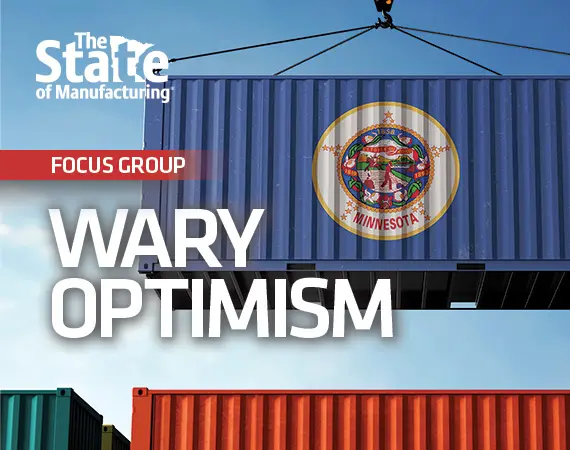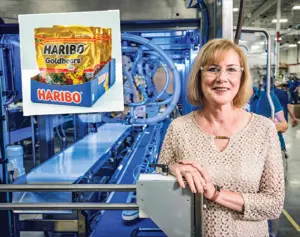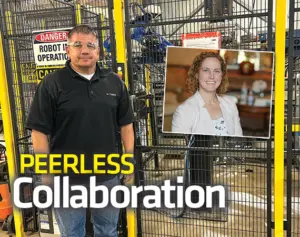Editor’s note: This is an edited transcript of a focus group of manufacturing executives conducted at Hennepin Technical College as part of the 2023 State of Manufacturing® survey research project. It was one of 12 focus groups.
Let’s talk about some of the legislative laws passed this past July. For example, small businesses will be forced to provide the same paid family and medical leave benefits as larger corporations. What’s your level of concern about that law?
- I would probably say I am somewhat worried. We’re aware of it, but it doesn’t go into effect until what, 2026? So, we’re aware of it. We really haven’t done anything to address it one way or the other, but it’s on our radar.
Another law requires employers to provide paid earned sick and safe leave. The next one is the cannabis law, and your ability to regulate it or not in the workplace. And then there’s a new wage theft law that makes property owners and developers responsible for any wage theft by subcontractors. What are your thoughts on all of those?
- We changed our new employee drug policy. Cannabis used to be excluded; that’s not the case anymore. The question is how do you track it, police it, whatever it might be, at the workplace? I don’t think there are any answers yet in terms of how it is going to be enforced.
- I work in HR, so the safe and sick time, there is a concern that is going to be demanded in addition to what we’ve already negotiated in our contract earlier this year. And then with cannabis, how do we monitor it? We’ve changed our pre-hire drug policy, and we’re doing a reasonable suspicion training for our supervisors in November. But it’s not clear what we can call out, what we cannot call out. We are very concerned.
- We’re pretty concerned about all the new laws because we’re in multiple states. So, do we enact these things just in Minnesota locations or do we enact across all of our facilities to be consistent? Do we have multiple policies? These are questions that we are asking ourselves at this point, and we haven’t come up with our solutions yet.
- We have employees who run forklifts and things like that, and there is concern with possible impairment and what we do. We have facilities in other states where cannabis is legal, but we decided if you still test positive, you can’t operate. And now I don’t know what we can do. You can’t test for it here, but you have to know if they’re impaired, especially if they’re running the machinery.
- I’m worried to varying degrees for each new law. There are already people gone or just calling in sick because they don’t want to come into work. As far as the sick and safe time, we already have enough PTO given for that, but I don’t know if some employees will think that they deserve more as a separate thing. Cannabis we’re somewhat concerned about but not too worried.
Let’s talk about the economy. How optimistic are you about the next 12 months? Are you pessimistic? Is it too early to predict?
- We serve a lot of different businesses and do a lot of manufacturing around the state, as do our counterparts in the pallet industry. So, we get a feel for sort of what’s up and down. And I would say my optimism is sort of neutral. I’m not expecting the economy to really drive volume up or down for us over the next 12 months. I’m really looking to go win new business as a driver of growth. What we’re hearing from our customers is that it depends on the industry — some are up, some are down — and that is why we are more neutral with our outlook.
- I don’t know what’s going on. It’s amazing to me that business is as good as it is when interest rates are so high.
- I’ll echo that, too. All our customers still have nice backlogs. Interest rates are going up, but we’re still seeing equipment financing, so that’s encouraging. We don’t see a lot of customers projecting significant growth, instead more stable growth. It feels like a lot of business owners have learned from the last recession that everybody’s set up to go lean if they have to with equipment and even staffing.
- There are so many conflicting indicators out there that I don’t think I’ve ever seen before. So, you really don’t know what the most critical factor is. We’re a small enough company and hopefully in enough different industries that it’s going to come down to our effort and our focus versus the macro factors. That’s how we’re approaching it right now.
Does your outlook influence or inhibit your ability to plan? How does uncertainty affect your plan?
- The uncertainty makes us more cautious to spend, in terms of buying additional equipment. The way I see it is there’s nothing really indicating if the economy is going to go up, but we are in a couple of different sectors to help protect us.
- We’ve been busy, and we have a pretty good backlog. So, I’m pretty optimistic that life is going to be good. An economist recently predicted things to be pretty good until 2030, which was kind of interesting, and he had a lot of statistics behind it.
- We’re probably going to spend less on capital, but we’re going to take the money and invest it in people — putting more training programs in place, putting more leadership development programs in place.
Is the worker shortage here to stay forever or is it going to shift over time?
- We have a critical succession situation that we need to take care of, so we’re trying to build that bench internally. Yes, it’s leadership development but it’s also skills gaps.
- We’ve noticed that while it seems people are looking for jobs, if you do hire them, they try out the job for half a day, it might be a week, but then they just don’t show up. I mean, they got to tour the facility and ask questions before they were hired, and then they leave and don’t even hardly tell you.
- Hiring has been hard. Yesterday, for example, I had an interview scheduled with a guy who was awesome on paper but didn’t show up. I called him and left a message saying, “Hey man, you’re 10 minutes late to your interview.” And he called me back three hours later and said his phone didn’t work. My staff is older, so we do have to replace and train from within and hang on to the people we have by any means. Our mentoring program is helping with that.
What are you doing to engage employees?
- Leadership development is one. We’re having a company party, and we usually do one holiday party. These are little things that I can think of right now.
- We started a free forum for employees to show up and ask leadership anything. For employees who might not interact with our CEO or interact with me very often, it’s an opportunity to ask questions. And that’s in our various locations. We’re in multiple states as well as Canada. The intent is to take note of what everyone says. We want to become an employer of choice, so each year we’re trying to add in different things to engage employees. It has been received very well so far in pretty much all our locations.
Let’s talk about supply chain. What are you seeing today? How are those issues impacting your organizations? Is it a big deal? Is it getting better?
- For us, it’s not a big deal. It’s forced us to become maybe a little more lean because of availability. But during COVID it was hard because we had to buy more to get a better price. And now for us it’s leveled out enough that we’re not really concerned about it.
- We have highly engineered metal components for some of our medical devices that still have 40-week lead times. So, we still have a lot of inventory to try to make sure there are no gaps in that lead time.
- Stock material was definitely hard for us to get, but we ended up buying larger mill runs and having more inventory to help cover us. However, with our building addition, I’ve now been waiting nine months to get a power transformer for it from Xcel. So, it’s interesting where the shortages come from. There are still things out there that are just unexplainable.
- For us, inventory’s the core of our business, and we have a replenishment formula that’s based on lead times and usage. We try to, of course, never run out of anything, but if all of a sudden the lead time goes from one week to 12 weeks, it really screws you up.
- I think there’s a shakeout happening. The whole COVID supply chain excuse is not acceptable, but it’s still happening. You get it as a consumer, you sometimes get it as a business buyer. I just flat out tell people it is no longer an acceptable excuse. You have to fix whatever your problems are to get your products available for us.
Let’s talk strategy and succession planning. Do you have a formal strategy in your organization? Does it include the succession of your people?
- I don’t know if we necessarily have a formal plan, but we did have a round of people retire in the last three years. We really tried to focus on cross-training and having more backups for each major position — such as, a team of people able to do something important on the quality engineering side versus just this one person who is always running all the jobs through. We have, I think, three to four more people who will retire in the next two years, so we will continue getting other people trained.
- As far as our ownership and leadership, it’s my father’s company. He is still involved in the business, and he’ll probably never retire, but I’m in place to take over with a group of leaders as well. We have a really strong leadership team.
- I have a plan B for anybody who leaves and how we’re going to fill that role short term, but not necessarily a succession plan in place or a formal strategy for the business.
- We have a one-year plan and a five-year plan.
- We don’t have a formal succession plan. There’s a particular person leaving soon who we’re still scrambling to figure out a way to fill his shoes. We’ve been cross-training so that multiple people can do the same job, so we’re working on it.
- We’re an EOS [Entrepreneurial Operating System] company, and EOS kind of forces you to have that one-, three-, and five-year vision and strategy set. So, I’m thankful for that. Otherwise, I’d probably wing it, and that wouldn’t be good.
- My son is planning on taking over. I don’t ever plan on retiring, maybe slowing down a little bit. I’ve spent a lot of time identifying people who plan to retire and then putting people in place for them. So, my son has the team to take care of things. I mean, I still have my 83-year-old mother working every day to help take care of payroll. How can I retire when my mother’s still working?
- We have a 10-year document we put together three years ago, and part of it is focused on people. Two years ago we put a succession plan together so that every three years we’re looking at the business and seeing where we think we need to be. Organizationally, a lot of that is to build up our leadership bench so that when I retire and some other execs retire, we’re able to fill it internally. We’re just in the early stages of that.
Let’s talk about automation. How do you all look at automation? Do you see it helping your companies going forward? How are your employees embracing automation?
- Automation is critical for our business because we can’t find the people. So how do we make it, how do we replace workforce with machines that can do the same or better?
- At first some people thought it was going to take away jobs, but it’s created more jobs. And there are some things that the robots do that no human being would want to do — like standing there and loading parts every 20 seconds and things like that. So, automation has elevated the skillset.
- We don’t have robots yet, but I have been trying to encourage our people to really think about where we could put automation in. One area of focus is our inspection equipment, more automated inspections versus people checking. But we’re just at the very start of it. I have it as a priority for us. I think it’s very important. And it’s not just machines or robots. Think of a computer system, whether it’s scheduling or creating work orders instead of doing them manually. We are trying to find ways to automate some of it overnight so we can take some of the burden off of the people who are having to do that.
- It’s been tough to put automation in when you’re changing a job so often, but I think we’ve got to challenge that thinking and see if there are other ways we can do it given the labor situation.
- We’ve had an automated pallet assembly machine for more than 20 years. Next Friday we’re doing a massive electronics upgrade, which connects it all. So, I think we’re automated in some ways. And I’m trying to figure out where the next step is on that journey.
- Human error happens all the time, so with inputting different numbers and invoices we’re trying to use AI to take all that data, put it into a file, and then kick it out where it needs to go. We’re constantly looking at AI platforms that we can bring into the fold.
What is an issue that keeps you up at night? What are you concerned about for the future?
- Our biggest worry is that our two largest customers are up on the range, and they’re in a big battle right now. It just makes them really hard to deal with, and there’s nothing you can do out there.
- I’m worried about the administrative burden of all the new laws and policies and procedures. I’m worried I’m going to miss something or not know something and it’s just going to catch me one day. So, I’m trying to stay out in front of that. I didn’t even know all these things were new laws. Fortunately, they’re not for a couple of years, but how to stay on top of them is tough.
- I was going to say exactly the same thing. The employment law changes worry me immensely.
- Inflation is what is worrying us quite a bit, especially with some sales being down. We want to make sure that the work is still coming in and that we’re managing our costs. For my dad, the owner, inflation’s the biggest thing on his mind. It definitely keeps him up at night. For me, it’s employees. We’ve had some attrition in certain departments, and now I’m just more worried about building a really good culture and keeping our employees.
- The legislative changes here in Minnesota are my biggest worries. If they continue in a fashion that’s not good for business, what does that mean? Does it continue to change the culture of your workforce?
…
Featured story in the Winter 2023 issue of Enterprise Minnesota magazine.


